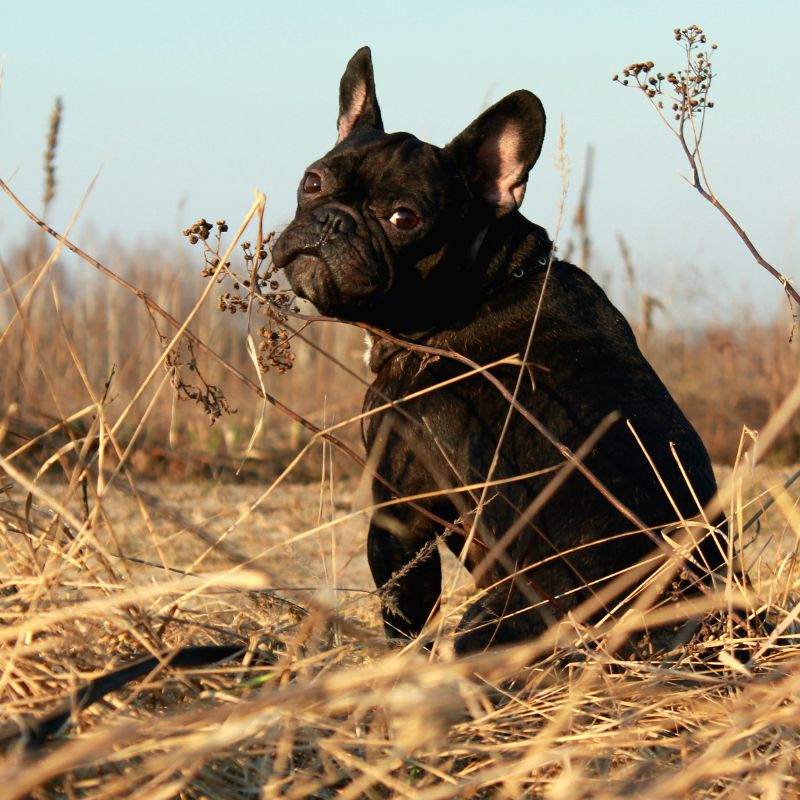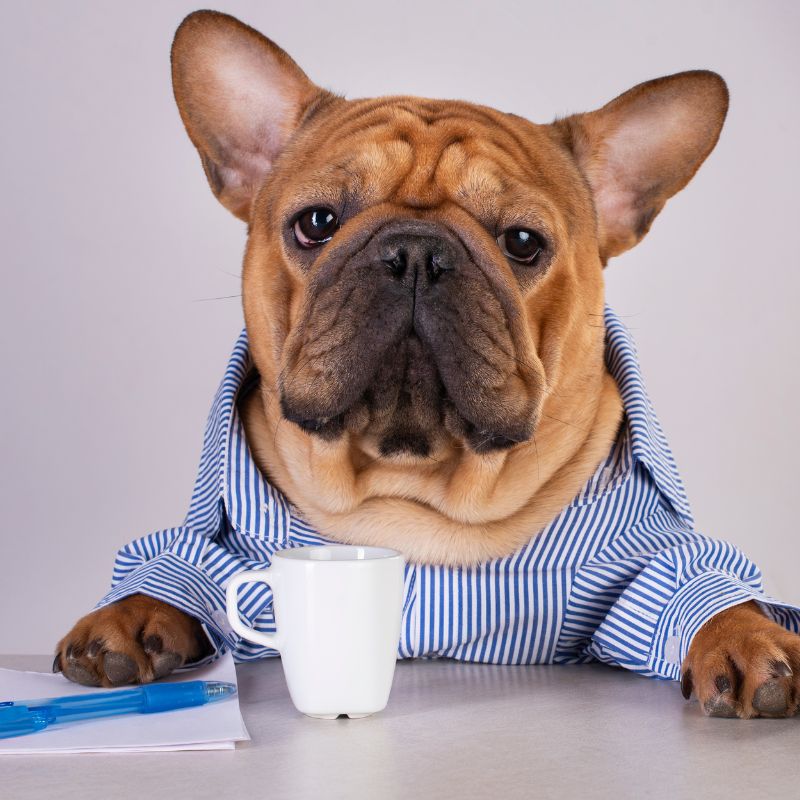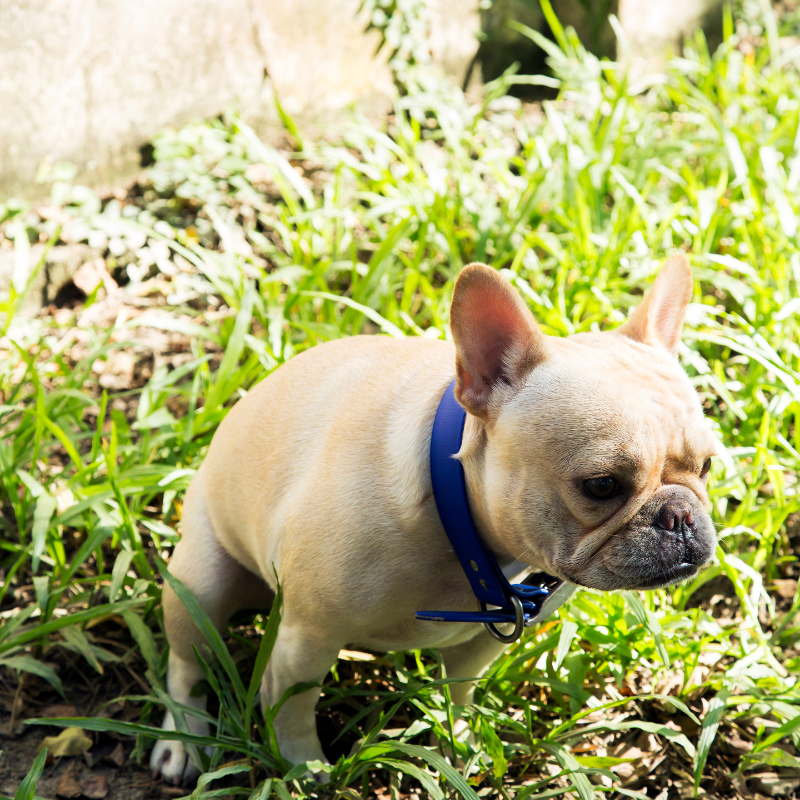How To Solve Diarrhea In French Bulldog? Best Treatment Tips

French Bulldogs are charming, playful companions, but they can be prone to sensitive stomachs. If you’ve noticed diarrhea in your French Bulldog, it’s natural to feel concerned. This guide will walk you through common causes, harmful ingredients to avoid, and effective remedies, including a homemade diet recipe to help your pup bounce back to good health.
Common Causes of Diarrhea in French Bulldogs
Before solving the problem, it’s essential to understand why it happens. Diarrhea in French Bulldogs can result from:
- Dietary Indiscretions
French Bulldogs are curious eaters, and consuming inappropriate food, such as table scraps or spoiled food, can lead to runny poop. - Food Sensitivities
Some Frenchies have food intolerances, commonly triggered by ingredients like dairy, wheat, soy, or certain proteins. - Sudden Diet Changes
Switching foods too quickly can upset their sensitive digestive systems. - Parasites or Infections
Giardia, worms, or bacterial infections may cause loose stool in French Bulldogs. - Stress or Anxiety
Emotional changes, such as moving to a new home or the absence of a family member, can upset their stomach. - Toxic Ingestion
Exposure to poisonous herbs, flowers, or harmful household items can result in gastrointestinal distress.
Ingredients That Cause Runny Poop in French Bulldogs
Certain ingredients in your dog’s diet or surroundings can be problematic. Here are common culprits:
- High-Fat Foods
Foods rich in fats, like fried chicken or fatty cuts of meat, can overwhelm their digestion, causing diarrhea. - Dairy Products
Many French Bulldogs are lactose intolerant, making cheese, milk, or ice cream a no-go. - Spicy or Seasoned Food
Garlic, onions, and strong spices are harmful and can irritate their gut. - Artificial Additives
Preservatives, food colorings, and artificial flavors can trigger loose stool in French Bulldogs. - Raw or Undercooked Food
While raw diets are popular, improperly handled raw food can harbor bacteria like salmonella or E. coli.
Toxic Ingredients to Watch Out For in Your Dog’s Environment
French Bulldogs are naturally curious, so be mindful of the following potential dangers in your home or garden:
Poisonous Herbs and Plants
- Aloe Vera: Harmful to Frenchies when ingested, causing diarrhea and vomiting. Even though Aloe Vera is good for their skin, it’s highly toxic to their bellies.
- Lilies: While particularly toxic to cats, some lily species can upset dogs’ stomachs.
- Foxglove: Contains toxins that can lead to severe health problems.
- Chamomile: Though soothing for humans, chamomile may cause diarrhea in dogs. Therefore, don’t try to add chamomile tea to your dog’s diet or waterbowl in case your dog’s dealing with stomach pains or diarrhea. It can only harm their digestive system.
Toxic Household Items
- Chocolate: Theobromine in chocolate is poisonous for dogs. Therefore, we don’t recommend you to reward your little gremlin with these tasty dessert even if he’s looking at you with those sad puppy eyes.
- Xylitol: Found in sugar-free gum and candies, it’s extremely toxic.
- Cleaning Products: Any accidental ingestion can irritate the stomach and intestines.
Harmful Outdoor Items
- Mushrooms: Wild mushrooms can cause severe diarrhea, vomiting, or even neurological issues.
- Fertilizers and Pesticides: Residual chemicals on grass or plants may harm your dog.
A Soothing Homemade Diet for Diarrhea in French Bulldogs
Switching to a bland, homemade diet is one of the most effective ways to calm a Frenchie’s upset stomach. Here’s a simple recipe to help ease diarrhea while ensuring balanced nutrition.
Homemade Diet Recipe
Ingredients:
- 1 cup of plain, cooked white rice
- 1/2 cup of boiled, shredded chicken (no skin or seasoning)
- 1/4 cup of mashed sweet potato
- 1 tsp of plain yogurt (probiotic, no added sugar)
Instructions:
- Boil the chicken thoroughly and shred it into small pieces.
- Cook the white rice until soft and easily digestible.
- Add the mashed sweet potato
- Mix all ingredients together and let cool to room temperature before serving.
- Feed small portions several times a day until diarrhea improves, gradually transitioning back to regular food.
Tips for Switching Your French Bulldog to a New Diet
Transitioning your French Bulldog to a new diet requires care to prevent further gastrointestinal upset. Follow these tips:
- Introduce New Food Gradually
Mix 25% of the new diet with 75% of the current food for a few days. Gradually increase the proportion of new food over 7–10 days. - Monitor for Reactions
Keep an eye on your Frenchie for any signs of discomfort, allergies, or worsening symptoms. - Hydration is Key
Diarrhea can dehydrate your dog. Ensure they have access to clean, fresh water at all times. - Consult Your Vet
Always discuss significant dietary changes with your veterinarian, especially if your dog has ongoing health issues.
Preventing Diarrhea in French Bulldogs
Prevention is the best cure. Keep these practices in mind to reduce the risk of runny poop in French Bulldogs:
- Stick to a Consistent Diet
Avoid sudden changes or introducing too many new treats at once. - Be Mindful of Treats
Offer healthy, dog-safe treats in moderation. Avoid table scraps or fatty snacks. - Supervise Outdoor Play
Keep an eye on your Frenchie during walks to ensure they don’t eat unknown plants or objects. - Practice Good Hygiene
Regularly clean their food and water bowls to prevent bacterial growth. - Routine Vet Checkups
Regular vet visits can catch potential health problems early, including parasites and infections.
When to See a Vet
Sometimes, diarrhea requires professional intervention. Contact your vet if your French Bulldog experiences:
- Severe or persistent diarrhea lasting more than 48 hours.
- Blood or mucus in their stool.
- Signs of dehydration (lethargy, sunken eyes, dry nose/gums).
- Vomiting in addition to diarrhea.
Can Anxiety Cause Diarrhea in French Bulldogs?
Yes, anxiety can be a significant factor in causing diarrhea in French Bulldogs. These lovable dogs are highly emotional and form deep bonds with their families. Sudden changes in their environment, routine, or the absence of a loved one can trigger stress, which affects their gastrointestinal system.
When French Bulldogs experience anxiety, their bodies release stress hormones like cortisol, which can disrupt digestion and lead to loose stool or diarrhea. Common anxiety triggers for French Bulldogs include:
- Separation Anxiety: Being left alone for extended periods.
- Loud Noises: Thunderstorms, fireworks, or construction sounds.
- Travel or Changes in Routine: Moving to a new home or changes in daily schedules.
- New Additions to the Family: Introducing a new pet or baby can make your Frenchie feel insecure.
How to Help Your Anxious French Bulldog
- Create a Safe Space
Provide a cozy, quiet area where your dog can retreat when feeling overwhelmed. - Stick to a Routine
Consistency in feeding, walking, and playtime helps reduce stress. - Engage Their Mind
Puzzle toys, training sessions, or gentle play can redirect their focus from stress triggers. - Calming Aids
Consider vet-approved calming supplements, pheromone diffusers, or anxiety wraps.
Understanding French Bulldog Poop: Types, Colors, and What They Mean
Monitoring your French Bulldog’s poop is an essential part of ensuring their health. The color, consistency, and shape of their stool can give you valuable insights into their overall well-being. Here’s a breakdown of what to look for and what different poop colors might indicate:
What Does Healthy French Bulldog Poop Look Like?
- Color: Healthy dog poop is typically a medium-brown color, resembling milk chocolate. This indicates a balanced diet and normal digestion.
- Consistency: It should be firm yet pliable, resembling the texture of Play-Doh.
- Shape: Healthy stool has a log-like shape and is easy to pick up without smearing.
If your Frenchie’s poop consistently matches this description, they are likely in good health. However, deviations in color, shape, or consistency may signal dietary or health issues.
Different Poop Colors and What They Mean
- Brown Poop
- Normal: Indicates a healthy diet and digestion.
- Darker Brown: May result from consuming a high-protein diet but still normal.
- Black or Dark Tarry Poop
- What It Indicates: This can be a sign of internal bleeding in the stomach or upper intestines.
- Action: Seek immediate veterinary attention.
- Green Poop
- What It Indicates: May suggest your dog ate grass, has a dietary imbalance, or is experiencing gallbladder issues.
- Action: If it persists, consult your vet.
- Yellow or Orange Poop
- What It Indicates: Indicates issues with the liver, gallbladder, or bile ducts.
- Action: A vet visit is essential if this color persists.
- Gray or Greasy Poop
- What It Indicates: Suggests malabsorption or pancreatic issues, such as exocrine pancreatic insufficiency (EPI).
- Action: Requires veterinary evaluation and potentially dietary adjustments.
- Red or Bloody Poop
- What It Indicates: May indicate bleeding in the lower gastrointestinal tract or anal area.
- Action: Immediate veterinary attention is required.
- White or Chalky Poop
- What It Indicates: Typically results from a diet too high in calcium or bone content (e.g., raw diets).
- Action: Adjust their diet to avoid complications like constipation.
Types and Shapes of French Bulldog Poop
- Firm, Well-Formed Poop
- What It Indicates: Healthy digestion and balanced nutrition.
- Soft or Mushy Poop
- What It Indicates: Can result from mild dietary changes, overeating, or stress.
- Action: Monitor for improvement and consider switching to a bland diet temporarily.
- Runny or Liquid Diarrhea
- What It Indicates: Often caused by dietary indiscretion, infections, or stress. Persistent diarrhea warrants a vet visit.
- Small, Hard Pellets
- What It Indicates: Dehydration or constipation.
- Action: Ensure your dog drinks plenty of water and add fiber to their diet.
- Segmented or Grainy Poop
- What It Indicates: May indicate malabsorption or an incomplete digestion of food.
- Action: Check their diet for potential allergens or irritants.
READ ALSO: What is the ideal French bulldog weight?
Final Thoughts
While diarrhea in French Bulldogs is common, it’s not something you should ignore. Identifying the cause and taking action promptly can save your pup from discomfort and prevent further complications. A carefully planned homemade diet, avoiding harmful ingredients, and making dietary changes gradually can work wonders for your Frenchie’s tummy troubles. With patience and care, your beloved companion will be back to their playful self in no time.








 French Bulldog Jackets & Coats
French Bulldog Jackets & Coats French Bulldog Dresses & Skirts
French Bulldog Dresses & Skirts French Bulldog Hoodies
French Bulldog Hoodies French Bulldog Sweaters
French Bulldog Sweaters French Bulldog Shirts
French Bulldog Shirts French Bulldog Pajamas
French Bulldog Pajamas French Bulldog Costumes
French Bulldog Costumes French Bulldog Life Jackets
French Bulldog Life Jackets

 French Bulldog Collars
French Bulldog Collars French Bulldog Harness
French Bulldog Harness
 French Bulldog Backpacks
French Bulldog Backpacks








4 thoughts on “How To Solve Diarrhea In French Bulldog? Best Treatment Tips”